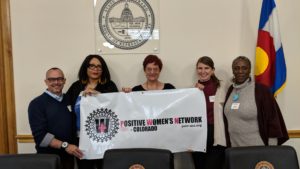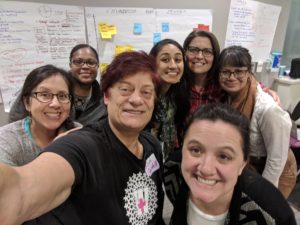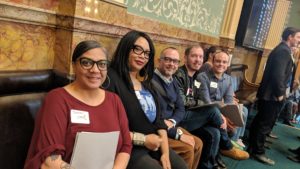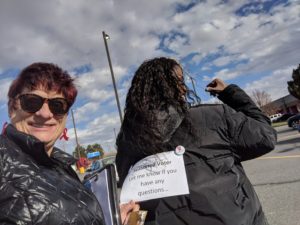
May 31, 2019: We all know that young people deserve comprehensive, LGBTQ-inclusive sexual education in school so that they can make informed decisions about their sexual health and reproductive options. Seeing that the existing 2013 law requiring comprehensive sex ed in the state was full of loopholes that allowed districts to bypass the requirement, the fearless advocates of PWN Colorado decided to take action. And May 3, they scored a big victory when the state legislature passed HB 19-1032. Governor Polis signed the bill on May 31.
Q. Colorado is not new to having a sexual education bill introduced to legislature. What were the rules around this before? Can you tell us a little about the work done at the state level to make this bill different from the one in 2013?
A. When we worked on the STI Modernization Act in 2016, one of the issues we addressed in partnership with the CO Mod(ernization) Squad was to ensure that the Colorado Department of Public Health created and implemented science-based, non-stigmatizing programs in districts that choose to teach the full sex education program; that minors continue to have access to quality reproductive health options without parental approval; and that LGBTQ and immigrant communities be protected in their access.
This bill for comprehensive sex education, HB 19-1032, continues to build on these successes. It includes a mandate that all sex education classes be comprehensive, discussing the full range of sexual health and reproductive health options; teach informed consent; the requirement that all pictures, descriptions and definitions be respectful and non-stigmatizing remains, but the requirement that all types of relationships, including LGBTQ relationship models, be represented, was removed at the last minute.
Parents can still opt their students out of the curriculum, but it does move towards banning abstinence-only education. However, Colorado is one of the few states that doesn’t require sex education or HIV education. That’s a project to work on moving forward.
 Q. How did PWN Colorado contribute to this effort? Who was involved in the planning?
Q. How did PWN Colorado contribute to this effort? Who was involved in the planning? A. PWN Colorado has been a part of the conversation around comprehensive sex education since 2013 and especially since our STI Modernization Act in 2016.
We started forming partnerships with the Women’s Lobby of Colorado, Progress for Colorado, Colorado Organizations and Individuals Responding to AIDS, Planned Parenthood of the Rocky Mountains, ACLU CO, One-Colorado, Colorado Cross Disability Coalition, and COLOR at our Women’s Strategic Summit PWN Colorado hosted in November of 2018. We connected with over 50 women; we are politically connected advocates in Colorado. We discussed the Comprehensive Sex Education bill and other bills that we are were planning on supporting through the 2019 Legislative session.
As the bills were being drafted, PWN Colorado was able to provide language for the bill, talk about the importance for statewide comprehensive sex education, and share concerns about the damage abstinence only programs do to Colorado youth, especially those in rural areas and underfunded metropolitan areas.
 Once the bill was introduced, PWN Colorado joined Planned Parenthood, Women’s Lobby of Colorado, and the ACLU in weekly emails pressuring the Colorado House/Senate leadership to assign the bill to an appropriate committee. Once it was voted out of committee, we pushed them to have floor discussion and votes. We organized phone trees and participated in advocacy days.
Once the bill was introduced, PWN Colorado joined Planned Parenthood, Women’s Lobby of Colorado, and the ACLU in weekly emails pressuring the Colorado House/Senate leadership to assign the bill to an appropriate committee. Once it was voted out of committee, we pushed them to have floor discussion and votes. We organized phone trees and participated in advocacy days. Once the bill was assigned to the Health and Human Services Committee, we testified at both the House and Senate committee meetings. Over 500 people testified at these hearings. The Senate hearing started at 1:00, and PWN Colorado hung tough, testifying at 10:30 PM–nine and a half hours later.
 We also participated in four advocacy days: CORA HIV Advocacy Day, Indivisible Advocacy Day, One-Colorado Advocacy Day, and Planned Parenthood Women and Children’s Wednesday. At each advocacy day we talked with state Representatives and Senators about our strong support for the comprehensive sex education bill.
We also participated in four advocacy days: CORA HIV Advocacy Day, Indivisible Advocacy Day, One-Colorado Advocacy Day, and Planned Parenthood Women and Children’s Wednesday. At each advocacy day we talked with state Representatives and Senators about our strong support for the comprehensive sex education bill.Thanks to Rica’s strong partnership with Planned Parenthood of the Rocky Mountains and the ACLU CO, we helped collect stories in support of comprehensive sex education and shared these stories with the Senators supporting passage ahead of the floor discussion, several were used to highlight the importance of real health education in our state despite some strong opposition to this bill.
Nicole Harrison, Rica Rodriguez, Laurie Priddy, Shannon Robinson, Queen Abrams, Mary Jane Maestas, Tammy Garrett-Williams, Kari Perry, Marquita Brown, Ully Putri, Davina Conner, PJ Patterson, and many other allies and partners were involved in planning, testifying, reporting, emailing, keeping up the pressure for floor votes and discussion.
Q. PWN Colorado co-chair Davina Conners talked to members of Congress at AIDSWatch about federal comprehensive sexual education. How did they respond?
A. We went to DC as a part of AIDSWatch and advocated for adolescent sexual health education. Davina shared stories about her teenaged daughter and her friends, and the lack of sexual education in their district. Our new Rep. Neguse’s staffer was very interested in the Colorado bill and how federal funding for abstinence-only programs and the Real Education for Health Youth Act would partner with ongoing legislative programs in Colorado.
Davina was able to talk about being an advocate, a mother, and a safe adult for “real” conversations about sexuality, relationships, consent, protection and healthy choices.
Q. How do you view the outcome of the proposed bill going forward? How will it impact rural schools and kids in less affluent school districts?
A. The bill passed the General Assembly on the very last day of session (May 3). It had a couple of amendments that remove some of the language around teaching acceptance of all types of relationships. It is waiting to be signed by Governor Polis. We will attend the bill signing and share pictures when this happens.
This bill included funding for school districts that don’t have the funds to add comprehensive sex education programs to their curriculum, with priority being give to rural schools, which will have a huge impact on youth empowerment and education.


